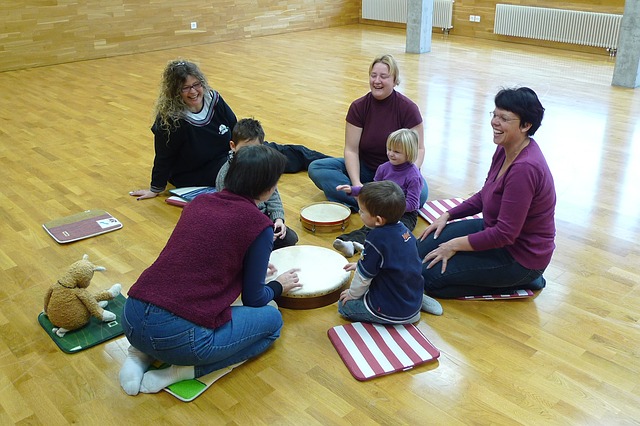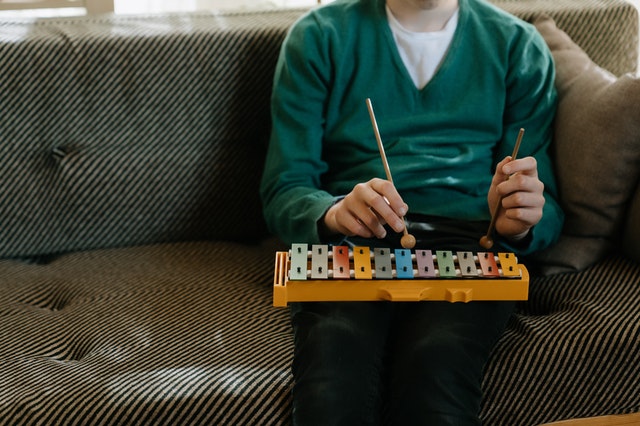Music enhances our lives in so many ways. It lifts our mood when we are feeling down, motivates us for a better workout, encourages us to move our bodies, and provides a great deal of entertainment. When music is used in therapy as “music therapy,” it helps children with autism communicate better, improve social skills, reduce anxiety and more. Read on for seven ways that music therapy benefits a child with autism.
Our son J loves music. He enjoys listening to music in his room. He definitely has his favorite musicians and songs that he likes to listen to over and over. In fact, when he was younger, he was obsessed with the Pet Shop Boys. (Yes, as in the popular 1980s British band that was best known then for their hit song, “West End Girls.” Fun fact is that they are still around, making wonderful music. I think I like their newer songs even better than the ones that were popular when I was a teenager!)
When J’s case manager brought up music therapy as an option under his autism waiver, he loved the idea of trying it. He was partnered with a wonderful music therapist, and he had weekly music therapy sessions for more than three years. He loved them! His therapist did a great job of helping him build coping skills for certain behaviors, reducing the anxiety he was feeling from school, building his self-esteem and encouraging him to try new things.
What is music therapy?

If you are not familiar with music therapy, you may wonder what it is. The definition from the American Music Therapy Association describes it as, “Music Therapy is the clinical and evidence-based use of music interventions to accomplish individualized goals within a therapeutic relationship by a credentialed professional who has completed an approved music therapy program. It is a well-established allied health profession that uses music therapeutically to address behavioral, social, psychological, communicative, physical, sensory-motor, and/or cognitive functioning.”
Music therapists create individual goals and plans for each child based on what skills need to be improved for an optimum quality of life.
Who qualifies as a music therapist?
The qualifications for a music therapist include:
- Has a bachelor’s or higher degree from a program accredited by the American Music Therapy Association (in the United States; other countries may have their own accreditation bodies.)
- Completed 1,200 hours of clinical training, which includes at least one supervised internship.
- May be board certified through the Certification Board for Music Therapists (in the United States; other countries may have their own certification process).
How can music therapy benefit your child with autism?

Music therapy offers many benefits for people with autism. Here are just seven ways music therapy benefits a child with autism:
1. Strengthens connections in the brain
Many researchers have studied several aspects of how music affects people’s brains. One interesting finding is that music stimulates both sides of the brain’s hemispheres. Other studies have shown how music therapy in particular can be used to create new and strengthen pathways in the brains. What does this mean? It means that music is a wonderful way that therapists can use to help children with autism learn new behaviors.
2. Improves communication
Music in general helps most people relate better to one another. That is no exception for kids on the spectrum. Music therapists are able to use music to relate to children with autism and help them communicate more effectively. While more research is needed for music therapy, studies to date have shown that music therapy does improve communication in children with autism, enhancing their interactions and increasing their self-confidence.
3. Enhances social skills

With better communication skills also comes better social skills. When your child can communicate better and has more self-confidence and self-esteem, they are able to relate to others more effectively. Studies have shown that music therapy can help children with autism improve their social skills.
4. Reduces anxiety
Reducing anxiety through music therapy was a big benefit our son J and his music therapy sessions. Research has shown that music therapy can reduce anxiety in children with autism.
5. Increases focus and attention
Studies also have shown that music therapy can increase focus and attention. That is so important for our kids with both autism and ADHD! I know our son J has no problem focusing on his special interest, but he struggles with the more boring activities or tasks he doesn’t want to do.
6. Improves body awareness and coordination

Let’s face it – music makes us want to move. Music therapists can incorporate music and movement into their treatment plans, helping children with autism become more aware of their bodies and even improve their coordination skills.
7. Encourages self-expression
Finally, music allows your child to express themselves. Music taps into our emotions and allows us to convey ourselves in unique ways.
How can I find a music therapist?

Music therapists are employed by schools, hospitals, private practices and other organizations. We found J’s music therapist through our case manager, because it was a service that was covered by his Medicaid autism waiver.
You could start your search through the online directory from the American Music Therapy Association. You also may do a search on Google for a music therapist near you. When I did that search, my local music therapist association for my state appeared.
Music therapy not only offers many benefits, but, if your child loves music, it’s a great way to learn and even enhance their musical skills.
Have you tried music therapy? What music therapy benefits did you encounter for your child with autism? Leave a comment and share with other parents and caregivers!







